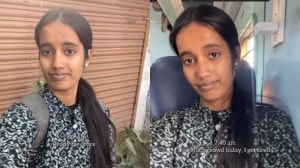An Open Web
Madhu Trehans documentation of the Tehelka sting is valuable in more ways than one
Prism me a lie,tell me the truth: tehelka As metaphor
Madhu Trehan,Roli,Rs 595
Madhu Trehans documentation of the Tehelka sting is valuable in more ways than one
On the evening of March 13,2001,the nation watched grainy,dark footage that showed how it simply took a few wads of currency notes and some enterprising reporters to expose the countrys conscience. The website Tehelka.com had broken Operation West End,the biggest undercover news story in Indian journalism. Armed with spycams and posing as arms dealers of a fictitious company,Tehelkas reporters bribed defence officers and got them to make outrageous claims and revelations. They caught Bangaru Laxman,president of the ruling BJP,on tape accepting money and gave money to Jaya Jaitly,president of the Samata Party,in defence minister George Fernandess home.
Madhu Trehan picks the story from there to document the exposé ,and the Kafkaesque events that followed,in this thoroughly researched book. And in doing so,she brings alive the books characters the characters in Operation West End who were part of the Indian medias big story for a while but were soon forgotten as it moved on,looking for newer stories and newer characters.
Trehan does a great job of following each of their stories,rewinding to their pasts and tracking how the exposé altered their lives. Theres Mathew Samuel,a maverick,aspiring journalist with a rumble in his belly for adventure journalism; Aniruddha Bahal,the brain behind the operation,Tarun Tejpal,the media face of Tehelka; several serving and retired army officers; Jaya Jaitly and George Fernandes,and the State with its Secret Auto Destruct System (SADS),as Trehan describes the way the government silently and ruthlessly went about destroying its enemy with raids,planted stories and sustained interrogation. Trehan writes: During her cross-examination,Jaya was asked 322 questions,Samuel 5,044,Bahal 5,016 and Tejpal 2,149 Doesnt that just say it all?
When Trehan started working,she thought it would be a breeze and the book would be ready within six months. But it took her six years of intense research,during which she conducted over 40 interviews.
As she worked on the book,she realised that there was no right or wrong here. No one character agrees that any particular event in the 500-hour original tapes took place the same way. Each event has as many versions as characters,which makes it impossible to come to any conclusion. So in the book,Trehan employs the lucid style of quoting each character from the Tehelka tapes,the Commission of Inquiry set up by the government and the Army Court of Inquiry. Though she intersperses the transcripts with her sharp,often witty,comments (Brigadier Iqbal Singh,an officer caught on tape with a prostitute,never got laid. But got royally screwed all the same),she leaves it to the readers to draw their own conclusions.
By simply documenting the investigation process,Trehan gives us an insight into how the system works. For instance,at the Commission,lawyers of those caught on tape exploit Mathew Samuels lack of fluency in English. One of them,Hariharan,asks Samuel for the meaning of slander,to which he replies: The meaning of slander I can tell in Malayalam. English, the lawyer insists and heckles him till Samuel gives up and says,I cannot.
Trehan isnt afraid to ask questions. Why does mendacity come so easily to Indians,whether Samuel or even Tehelka were right in the way they approached the subject and if journalists should draw the line somewhere. She skillfully steers her way through a complex subject and in the process,juggles philosophy and dark humour with an examination of values.
To help you find your way through this maze of characters,Trehan offers a solution. Just as in Akira Kurosawas film Rashomon (1951),where the audience realises that each persons perspective distorts events and reality and there cant be an absolute truth,Trehan says,Yes,the Tehelka story is based on facts,but which of these are in double bold,which are in italics and which are in fine print? That perception lies in the eye of the beholder. In that sense,this is an open book.
- 01
- 02
- 03
- 04
- 05






























